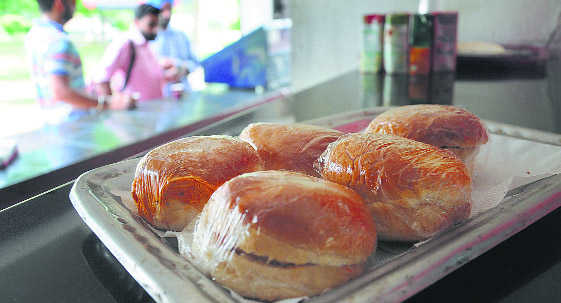
An unhealthy idea: Schools have clear instructions on what they can and cannot sell on campus. Junk food is certainly out of question Tribune file photo
Pushpa Girimaji
The canteen at my daughter’s school sells only junk food. I have spoken to the school principal several times on this issue, but she dismisses it on the ground that the canteen sells what the children like. Obviously, the children are too young to know what is good for them and what is bad. Besides, when they are hungry, they have no option but to eat/drink whatever is available. Many of the children in the school seem overweight and obese and I would not be surprised if the contributing factor is the canteen food. How do I deal with this?
You have raised an extremely important issue pertaining to children’s health and if only more parents show such concern, I am sure all foods high in fat, salt and sugar (HFSS), that contribute to obesity and ill health, will be taken off the shelf at school canteens and they will also begin to eat healthy food at home.
Having said that, I must point out that today schools have clear instructions on what they can and cannot sell at school canteens. They certainly cannot sell unhealthy junk food. In 2015, in response to a public interest litigation filed by Uday Foundation, the Delhi High Court directed the Delhi administration to implement the guidelines framed by the Food Safety and Standards Authority of India on “promoting wholesome and nutritious food and restricting/limiting the availability of foods high in fat, salt and sugar.” The court also directed the Central Board of Secondary Education to consider similar steps in respect of schools affiliated to it.
Following the high court order, CBSE directed all its affiliate schools to desist from serving fast foods in schools and to replace junk food —that is foods high in fat, sugar and salt — with healthy snacks. It also directed the schools to replace aerated/carbonated beverages with fruit juice and dairy products. Subsequently, the University Grants Commission too issued similar instructions against the sale of junk food in institutions of higher learning.
Meanwhile, several state education departments have directed schools not to sell HFSS foods in their canteens. The National Commission for Child Rights has also instructed the State Child Commissions to ensure that children are not given such food.
So, tell the principal that the school is violating the instructions of various authorities on junk food and if the school does not change its menu, you will be forced to complain to all of them. And you must complain to the CBSE, FSSAI, State Child Rights Commission and the directorate of education. If you wish, you can also get other parents to join you in your complaint. The school cannot sell unhealthy food to children.
What else needs to be done to curb consumption of HFSS food, not just in school canteens, but outside too?
I do not know if you have seen the latest report on the citizen’s health profile released by the Central Bureau of Health Intelligence recently. It shows a high prevalence of non-communicable diseases such as diabetes and hypertension in the country.
As per the National Health Profile of India (NHPI) 2018 data, out of the 35.7 million people screened at the non-communicable diseases (NCD) clinics in 2017, 8.41 per cent (3 million) were diagnosed with diabetes and 10.22 per cent (3.6 million) with hypertension.
The huge numbers call for immediate measures to bring down the morbidity and mortality connected with these lifestyle diseases. The urgency is all the more when we consider the high prevalence of pre-diabetes in the country. An ICMR-INDIAB population-based cross sectional study covering 15 states and published in The Lancet in June 2017, had put the overall prevalence of pre-diabetes in the population at a whopping 10.3 per cent and diabetes at 7.3 per cent. Obesity among school children is also of great concern.
So, we need to educate children (and adults too) on the importance of eating healthy and exercising. In addition, I do feel that we must have graded taxation based on FSS content — higher the fat, sugar or salt content in food, higher the taxation. And the taxes should be high enough to make a difference. To come down to a lower tax slab, the industry will be forced to bring down harmful ingredients in the food. Besides, we must also prohibit advertisements of all foods that come under the highest taxation bracket on account of their high FSS content.



























